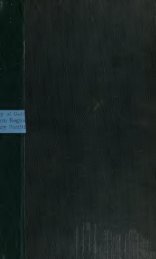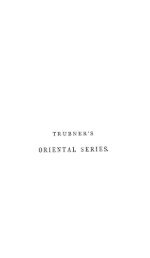Untitled
Untitled
Untitled
Create successful ePaper yourself
Turn your PDF publications into a flip-book with our unique Google optimized e-Paper software.
f _<br />
I<br />
ids'* . NOTES ON THE FIRST DISCOURSE<br />
mourned* by many poets, incju&ing Hazimi of* Abiward, three of whose<br />
verses,are quoted in the -Persian notes (pp. 102-^3). Tha'alibc says in<br />
the Yatimatifd Dahr (vol. iv, pp. 29-33) that Iskafi had much gre^cei;<br />
skill in official than in private and friendly correspondence, and that,<br />
like the celebrated writer al-Jahiz, he was as strong in prose as he was .<br />
weak in verse.<br />
*<br />
There can be little deubt that the" anecdote of the forged letter<br />
mentioned above forms the historical basis of a well-known story in<br />
the Gulistdn of Sa'di (ed. Platts, pp. 35-6; Book I, Story 25). The<br />
same anecdote is given by Yaqiit in his notice of Iskafi in the IrshddiSl-<br />
Arib (ed. Margoliouth, val. v, pp. 329-331).<br />
*<br />
IV. Historical errors ill Anecdote II.<br />
(Text, pp. 13-15; Persian notes, pp. 103-105.)<br />
This anecdote furnishes several striking instances of the glaring<br />
anachronisms and historical inaccuracies which too often deface the<br />
otherwise admirable work of our author.<br />
(<br />
(1) Iskafi could not possibly, have been secretary to Niih II irAi<br />
Mansiir, who reigned from A.H. 366 to 387 (A.D. 976-997), since, as<br />
we have seen, he died soon after the accession of 'Abdu'l-Malik in<br />
343/954-5. Nor can we suppose that we are confronted with a mere<br />
scribe's error as to the name of the reigning king, since the whole<br />
point of the story lies in the king's name being Nuh.<br />
(2) Alptagin died, according to different authorities, in 352/963,<br />
351/962-3,<br />
or 354/965, while Nuh II ibn Mansiir did not ascend the<br />
throne until 366/976-7, so that to represent the former as living in the<br />
reign of the latter is an evident anachronism. The author has probably<br />
either confused this king with his father Mansiir I ibn Niih (reigned<br />
from 350/961-2 until 366/976-7), against whom Alptagin actually<br />
rebelled, and even conquered Ghazna (not Herat, as the author<br />
erroneously asserts); or (and this is perhaps more probable) has confused<br />
Alptagin with Abu 'Ali<br />
Simjiir, who raised a formidable rebellion<br />
Niih II ibn Mansiir.<br />
against<br />
i (3) It is true that in 383/993-4 the above-mentioned Niih summoned<br />
Subuktagin from Zabulistan to help him, but not against Alptagin, who<br />
at this date had been dead thirty years ; and not in conjunction with<br />
but against Abii 'Ali Simjiir, who had long been in rebellion aga'inst him.<br />
(4) It is almost certain that by " Abu'l-Hasan 'AH ibn' Muhtaj al-<br />
Kashani...the Chief Chamberlain " our author means the famous general<br />
Amir Abii 'Ali Ahmad ibn Muhtaj as-Saghani ty.e. of Chaghaniyan), who,<br />
however, died in 344/955-6, i.e. 22 years before Niih II succeeded to the<br />
throne, and 39 years before Subuktagin led his army into KhurJrsan in,<br />
3 8 3/993-4.<br />
, According to that great scholar AbU 1<br />
Rayhan al-Biruni ,'<br />
the occasion<br />
when this verse of the Qur'dn (xi, 34) was so aptly quoted was quite<br />
different, viz, by Abii Ahmad Khalaf ibn Ahmad the ruler of Sijistan<br />
1<br />
Al-AthdruU-Bdqiya (ed. Sachau), p. 332.








![La religione di Zarathustra nella storia religiosa dell' Iran [microform]..](https://img.yumpu.com/15970820/1/151x260/la-religione-di-zarathustra-nella-storia-religiosa-dell-iran-microform.jpg?quality=85)


